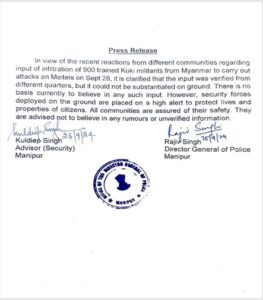On September 17, a leaked intelligence report from the Chief Minister’s Office of Manipur (CMO) claimed that over 900 Kuki militants had entered Manipur from Myanmar. This report, which circulated widely, alleged that these militants were newly trained in drone-based bombs, projectiles, missiles, and jungle warfare. The militants were reportedly organised into units of 30, scattered along the periphery, and expected to launch coordinated attacks on Meitei villages around September 28. Needless to say that in the one week between September 17 and 25 when it was formally (but in a low key way) denied, it generated its own brand of divisiveness on ground affecting communities and on social media.
On September 25, Manipur’s security advisor Kuldiep Singh and director general of police Rajiv Singh issued a joint statement disputing the CMO’s claims. According to The Indian Express, they clarified that the intelligence report “could not be substantiated on the ground,” leading the CMO to retract its initial statement.

Panic and tensions escalate due to fake news: The circulation of the unverified intelligence report from the Chief Minister’s Office (CMO) alleging the infiltration of over 900 Kuki militants from Myanmar sparked immediate panic and unrest across the already tense state of Manipur.
The inflammatory nature of the report, which included detailed claims of militants equipped with drone-based bombs and coordinated attack plans, amplified existing ethnic divisions between the Kuki-Zo and Meitei communities. Rumours spread rapidly, leading to heightened fear and suspicion, with both sides feeling threatened and vulnerable to violence. Social media platforms, in particular, became a hotbed for the dissemination of this information, further fuelling the chaos as people reacted to the alleged threat without waiting for verification.
The news, which was found to be fake, had tangible effects on the ground, especially in areas with mixed populations of Kuki-Zo and Meitei communities. Kuki groups, feeling targeted by the report, mobilised shutdowns and issued public warnings to stay home, halting daily life and escalating tensions. The Meitei community, on the other hand, became increasingly alarmed, fearing an imminent attack, which led to calls for bolstering security in their villages. The confusion and distrust sown by the report not only strained the fragile peace but also posed a risk of provoking violent confrontations, as both sides were led to believe they were under attack. This chaos was exacerbated by a general atmosphere of uncertainty, further complicating efforts to maintain law and order in the state.
Security response and backlash from Kuki-Zo groups: Despite this, on September 20, Kuldiep Singh informed reporters that security agencies, particularly the Assam Rifles, had been placed on high alert in hill districts bordering Myanmar in response to the intelligence input. He noted that the issue had been discussed in a Strategic Operation Group meeting with senior officials from various security forces, including the Army, Assam Rifles, Central Reserve Police Force (CRPF), Border Security Force (BSF), and state police.
Kuldiep Singh’s remarks were met with criticism from Kuki-Zo groups. The Indigenous Tribal Leaders’ Forum (ITLF) accused him of spreading “devious propaganda” to defame the Kuki-Zo people, claiming that the report could be used as a pretext for attacks on Kuki-Zo volunteers. In response to these concerns, Manipur’s top security officials issued a clarification, confirming that while security forces remained on high alert to protect citizens, the intelligence input had not been substantiated. They urged communities to remain calm and avoid spreading or believing in rumours.
Shutdowns and concerns of violence: Following the joint statement, the CMO communicated with the Information and Public Relations Department and security officials, formally retracting its earlier claims.
In reaction to the government’s claims, several Kuki groups called for a shutdown in tribal-dominated areas. The Kuki Inpi Manipur (KIM), an apex Kuki organization, and the Indigenous Tribal Leaders Forum (ITLF), based in Churachandpur, released statements on Tuesday condemning the intelligence report as unfounded. The KIM asserted that the CMO’s report about 900 Kuki militants infiltrating from Myanmar and planning coordinated attacks on September 28 was baseless, accusing the government of fabricating the claim to justify a potential attack on the Kuki-Zo community.
The Kuki organisations called on their people to stay home and avoid travel or work on September 27 and 28. They announced a total shutdown across all Kuki-inhabited regions on September 28, with enforcement to be overseen by Kuki Inpi and the KSO in their respective areas. The groups also expressed concern over potential attacks targeting Kuki areas on the 28th and advised Kuki-Zo village volunteers to reinforce their positions in the ‘buffer zones.’
Related:
Manipur plunges into deeper turmoil amid fresh violence and drone attacks since early September
Mob fury: Manipur HRD, Babloo Loitongbam’s home attacked in Imphal

